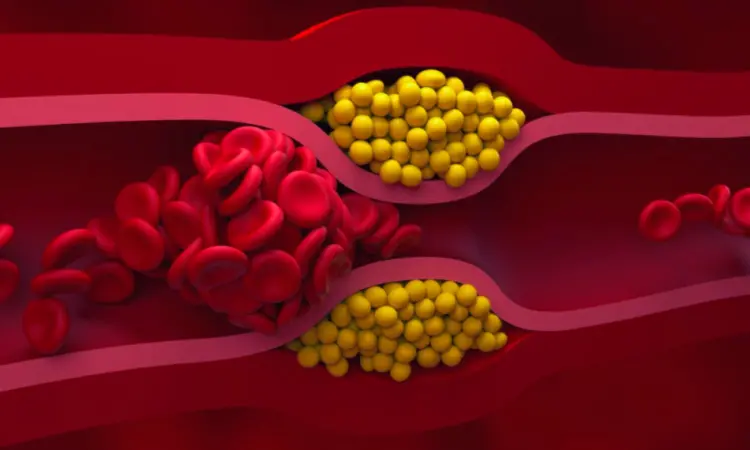- Home
- Medical news & Guidelines
- Anesthesiology
- Cardiology and CTVS
- Critical Care
- Dentistry
- Dermatology
- Diabetes and Endocrinology
- ENT
- Gastroenterology
- Medicine
- Nephrology
- Neurology
- Obstretics-Gynaecology
- Oncology
- Ophthalmology
- Orthopaedics
- Pediatrics-Neonatology
- Psychiatry
- Pulmonology
- Radiology
- Surgery
- Urology
- Laboratory Medicine
- Diet
- Nursing
- Paramedical
- Physiotherapy
- Health news
- Fact Check
- Bone Health Fact Check
- Brain Health Fact Check
- Cancer Related Fact Check
- Child Care Fact Check
- Dental and oral health fact check
- Diabetes and metabolic health fact check
- Diet and Nutrition Fact Check
- Eye and ENT Care Fact Check
- Fitness fact check
- Gut health fact check
- Heart health fact check
- Kidney health fact check
- Medical education fact check
- Men's health fact check
- Respiratory fact check
- Skin and hair care fact check
- Vaccine and Immunization fact check
- Women's health fact check
- AYUSH
- State News
- Andaman and Nicobar Islands
- Andhra Pradesh
- Arunachal Pradesh
- Assam
- Bihar
- Chandigarh
- Chattisgarh
- Dadra and Nagar Haveli
- Daman and Diu
- Delhi
- Goa
- Gujarat
- Haryana
- Himachal Pradesh
- Jammu & Kashmir
- Jharkhand
- Karnataka
- Kerala
- Ladakh
- Lakshadweep
- Madhya Pradesh
- Maharashtra
- Manipur
- Meghalaya
- Mizoram
- Nagaland
- Odisha
- Puducherry
- Punjab
- Rajasthan
- Sikkim
- Tamil Nadu
- Telangana
- Tripura
- Uttar Pradesh
- Uttrakhand
- West Bengal
- Medical Education
- Industry
High Triglycerides Drive Residual Cardiovascular Risk Despite Optimal Lipid-Lowering Therapy: Study Shows

Netherlands: A new study published in Atherosclerosis reveals that elevated triglyceride (TG) levels are strongly associated with an increased risk of recurrent cardiovascular events and mortality in patients with established cardiovascular disease (CVD), regardless of how well other lipid targets are managed. The study, led by Pauline C.E. Schuitema and colleagues from the Department of Vascular Medicine at University Medical Center Utrecht, underscores the growing importance of addressing triglycerides as part of secondary prevention strategies.
"Elevated triglyceride levels strongly predicted higher residual risk in patients with established CVD. Each 1-unit increase in log-TG was linked to greater risk of myocardial infarction (HR 1.34), recurrent cardiovascular events (HR 1.17), cardiovascular mortality (HR 1.23), and a 12% rise in all-cause mortality—independent of LDL-C, non-HDL-C target achievement, HDL-C levels, or lipid-lowering therapy intensity," the researchers reported.
While low-density lipoprotein cholesterol (LDL-C) management is a central pillar of CVD treatment, many patients continue to experience residual cardiovascular risk even after reaching guideline-recommended LDL-C levels. The research team investigated whether elevated triglycerides contribute to this persistent risk and whether this risk is influenced by LDL-C and non-HDL-C target achievement, high-density lipoprotein cholesterol (HDL-C) levels, or the intensity of lipid-lowering therapy (LLT).
The prospective cohort study included 9,436 individuals with established CVD. Researchers used Cox regression models to evaluate the relationship between triglyceride levels and the incidence of cardiovascular events and mortality over a median follow-up period of 9 years (interquartile range: 4.5 to 14.1 years).
The study led to the following findings:
- Each one-unit rise in log-transformed triglyceride levels was associated with a 17% higher risk of recurrent cardiovascular events.
- A 34% higher risk of myocardial infarction was linked to elevated triglyceride levels.
- Triglyceride elevation corresponded to a 23% increase in cardiovascular mortality.
- All-cause mortality increased by 12% with higher triglyceride levels.
- These risks remained consistent regardless of LDL-C or non-HDL-C target achievement, HDL-C levels, or lipid-lowering therapy intensity.
- During the study, there were 2,075 recurrent cardiovascular events, 736 myocardial infarctions, 586 strokes, 1,231 cardiovascular deaths, and 2,729 all-cause deaths.
- No significant association was found between elevated triglycerides and stroke risk alone.
According to the authors, these findings emphasize the importance of monitoring and managing triglyceride levels in patients with CVD, alongside traditional lipid targets like LDL-C. The research highlights the potential benefit of incorporating targeted interventions—such as lifestyle changes and dietary adjustments—into secondary prevention plans to address the residual cardiovascular risk associated with elevated TGs.
The study concludes that triglyceride management should be prioritized as part of comprehensive cardiovascular care to help mitigate ongoing risk in patients already receiving intensive lipid-lowering therapy.
Reference:
Schuitema, P. C., Visseren, F. L., Nordestgaard, B. G., Teraa, M., Van der Meer, M. G., Ruigrok, Y. M., Onland-Moret, N. C., & Koopal, C. (2025). Elevated triglycerides are related to higher residual cardiovascular disease and mortality risk independent of lipid targets and intensity of lipid-lowering therapy in patients with established cardiovascular disease. Atherosclerosis, 120411. https://doi.org/10.1016/j.atherosclerosis.2025.120411
Dr Prem Aggarwal, (MD Medicine, DNB Medicine, DNB Cardiology) is a Cardiologist by profession and also the Co-founder and Chairman of Medical Dialogues. He focuses on news and perspectives about cardiology, and medicine related developments at Medical Dialogues. He can be reached out at drprem@medicaldialogues.in


